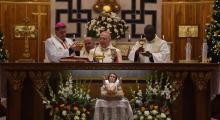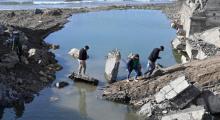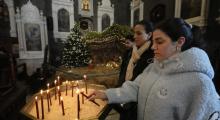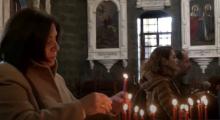Issued by the Catholic Center for Studies and Media - Jordan. Editor-in-chief Fr. Rif'at Bader - موقع أبونا abouna.org
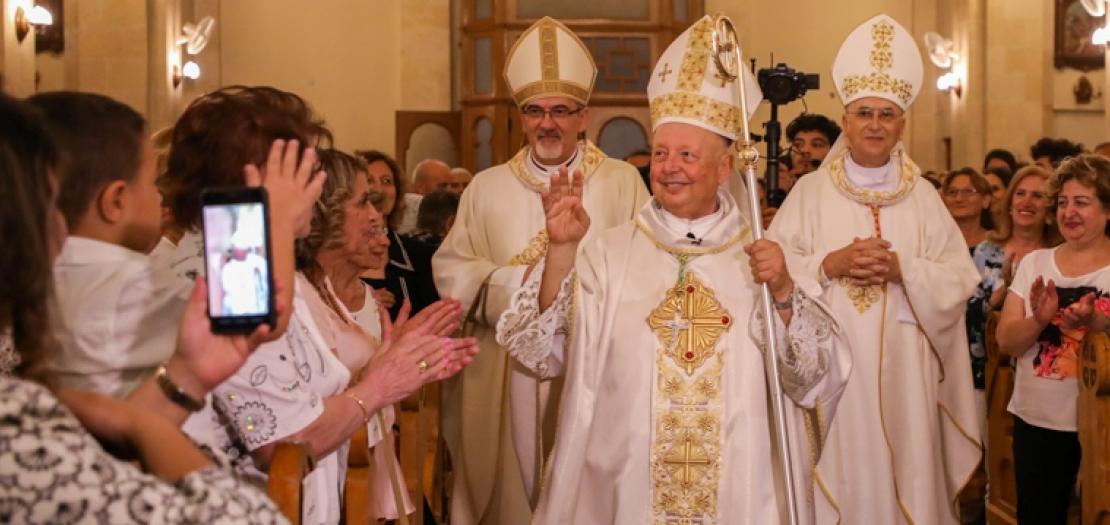
Of the 10,000 or so Christians who lived in Idlib Governorate before the war, there are today only about 650, mainly older people in rural areas,” Bishop Hanna Jallouf told a visiting delegation from Aid to the Church in Need (ACN) in Damascus. “After the extremists took control of the area in the first years of the war, most Christians fled because of the difficult living conditions.”
For centuries, Idlib Governorate, on the border with Turkey, was predominantly populated by Christians, but during the war it became the stronghold of anti-government rebels – and has remained so until today. Throughout the war, which began in 2011, Fr. Jallouf stayed with his people. On 5 October 2014, the Franciscan, who was at the time pastor of the Syrian town of Knayeh, was abducted by fighters from the al-Nusra Front, along with about 20 members of the parish, and held captive for five days.
Ten years on, he is Apostolic Vicar of Aleppo for the Latin rite Catholics in the whole of Syria. “Pope Francis probably named me a bishop because I know the situation here very well,” says Bishop Jallouf, who is the first Syrian to be appointed to this position. “As a priest in a parish I was in contact with the rebel groups, and was always dealing with them, right through the war. And I continue to do so.”
The respect of the rebels in a country where the northwest is still controlled by Islamist militias is very significant. Christian life there is very restricted. According to the bishop, Christians are forbidden from carrying out religious practices outside the church or to display religious symbols like statues and crosses.
With the escalation of the war, all Christian teachers were removed from their posts, which led to many Christian families withdrawing their children from school. “Now they teach their children at home, to avoid the appearance of a Christian school gathering,” the bishop told ACN. The bishop further explained that for their final exams the children have to travel to other governorates like Aleppo and Hama, at an extravagant cost of around 3,000 dollars per person for transport and accommodation.
In other parts of Syria, the Christian presence is also seriously threatened. Many Christian families have left the country to seek a better life in Europe, Canada and Australia. Thirteen years of war, extremely high inflation and bitter poverty have left the country exhausted. Estimates suggest that 90 per cent of the Syrian population lives below the poverty line. In Aleppo and Hassakeh emigration is so high that, according to a local source, by 2050 there will be no functional Christian community.
Bishop Jallouf says that as a priest he was a “simple pastor” and explains he wants to remain close to the people as a bishop. One of his priorities since his appointment has been to visit all the Latin rite parishes, congregations and Catholic institutions in the country, to get the know the local needs directly.
The bishop says he is pleased with the partnership with ACN. This summer the international charity made it possible for more than 1,500 children and young people belonging to the Latin rite to attend summer camps, and after the devastating 2023 earthquake in northern Syria, ACN helped to rebuild a church and 50 houses for Christian families of the Latin rite in Idlib. It also supported emergency relief projects like “Meals on Wheels” for elderly people who had nobody to care for them.
“Ten years have passed since my abduction, and we hope that the last ten years will not be repeated. We forgive, but we don’t forget, that’s what Christ taught us,” said the bishop. “These days I pray to God for compassion, forgiveness and liberation from war and for the restoration of peace, harmony, stability and wealth in this wounded country. We hope that, with the intercession of the Blessed Virgin Mary, our faithful martyrs and all the saints, it will once again become a country of love, respect, forgiveness and co-existence between the various communities and religions.”



